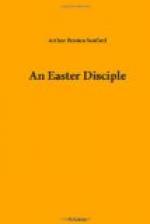Now comes the opportunity for Quintus himself to hear this new Teacher of the Jews. A messenger from Pilate, sent on an errand to the headquarters at Scopus, brings the tidings that Christ is in Jerusalem as a visitor at the Feast of Dedication. Favored are those who hear through the years the world’s commanding voices; beyond estimate is the high privilege now granted Quintus.
“I will hasten in to Hierosolyma,” he says to Aulus, who is detained by camp duties; “I will hear him for myself; and I will bring you back report as to this latest prophet of immortality.”
With his soldier’s cloak about him, in protection against the winter’s chill, Quintus is away to Jerusalem. The national Feast of Dedication attracts his notice. A courteous Hebrew explains to him that the joyful festival commemorates the cleansing of the Temple after its profanation by Antiochus Epiphanes, two hundred years before. The procession of pious Jews, carrying their palm branches and marching to the heights of Moriah, the chanting of the great Hallel within the imposing fane, the ascription of praise to Jehovah all impress the keen-eyed soldier.
The enthusiasm of it all! Though of other blood, Quintus clearly feels the thrill of patriotism that stirs the multitude about him; and he understands in some measure their impatient waiting for the coming prince who shall deliver Israel.
But is this all? Instead it is only the beginning of the wonders which the serious Quintus is to witness. Forth he passes to the eastern cloister of the Temple, known then among the Jews as Solomon’s Porch, in memory of their illustrious king. The bystanders tell Quintus that it is built of a fragment of the first Temple which Nebuchadnezzar had left standing. As the soldier looks down the far-reaching aisle, he sees a quadruple row of white Corinthian columns, one hundred and sixty in number, and extending a length of many hundred feet. The vista is most amazing. Accustomed though he has been all his days to the magnificence of the Roman architecture, he yields in willing admiration to the splendors of the Solomonic porch.
Then—he sees the Christ! Walking through that forest of massive columns is the superlative Jew of his times, and of all times. For now—when the voices of that winter day are still, and Solomon’s Porch has vanished where stood those blessed feet—there is no earthly measurement by which to estimate the Man whom Quintus saw.
Among the throng that surround him hostile Pharisees challenge him to tell them plainly if he be the foretold Messiah. With impatient hearts they have waited long for their redemption. Let him say if their deliverer has now come. Then shall they throw off the yoke of the detested Roman rule and renew their ancient monarchy with enlarging influence and increasing splendors.




